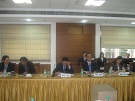A five-member delegation from China Institute of International Studies, led by Dr. Guo Xiangang, Senior Research Fellow, called on the VIF faculty on Nov 24, 2014 as part of a larger deliberative process initiated by Chinese think tanks across the Asian region to garner support for China’s proposed ‘one road, one economic belt’, an initiative that seeks to integrate the vast Eurasian landmass through various sea and land-based economic corridors. Announced by China’s President Xi Jingping during his visit to Central Asia in September last year, the proposed economic corridors are expected to cost china a whopping $40 billion. The Chinese scholars, while briefing the VIF faculty about the finer points of the proposal, said the initiative is basically aimed at developing China’s western region as also other countries that lie along the route.
 As part of its envisaged trans-national land and maritime transport policy, China plans to develop transport corridors from the Pacific to the Baltic Sea and gradually develop a network of land-based economic corridors to cover most parts of Asia, including East Asia, the Middle East and the subcontinent. In all, plans are afoot to develop six economic corridors – China-Russia-Mongolia (North to South), New Eurasia Bridge, China to Central Asia to the West Asia, Bangladesh-China-India-Myanmar Corridor, China-Pakistan Economic Corridor, and Maritime Corridor in the South. The visiting scholars, however, said while China expects regional countries to study the proposal in-depth, it is ultimately for them to decide whether to join the initiative or not. China, however, expects India, an important country on the Eurasian bridge, to be on board for the proposal to realise its full potential. They also indicated that China’s future Asian strategy would potentially revolve around ‘one road, one economic belt’. Allaying India’s apprehensions, they said ‘one road, one belt’ would not impact India’s economic interests. On the contrary, it would accrue a whole lot of benefits to the participating countries.
As part of its envisaged trans-national land and maritime transport policy, China plans to develop transport corridors from the Pacific to the Baltic Sea and gradually develop a network of land-based economic corridors to cover most parts of Asia, including East Asia, the Middle East and the subcontinent. In all, plans are afoot to develop six economic corridors – China-Russia-Mongolia (North to South), New Eurasia Bridge, China to Central Asia to the West Asia, Bangladesh-China-India-Myanmar Corridor, China-Pakistan Economic Corridor, and Maritime Corridor in the South. The visiting scholars, however, said while China expects regional countries to study the proposal in-depth, it is ultimately for them to decide whether to join the initiative or not. China, however, expects India, an important country on the Eurasian bridge, to be on board for the proposal to realise its full potential. They also indicated that China’s future Asian strategy would potentially revolve around ‘one road, one economic belt’. Allaying India’s apprehensions, they said ‘one road, one belt’ would not impact India’s economic interests. On the contrary, it would accrue a whole lot of benefits to the participating countries.
The Indian interlocutors said while they supported BCIM (Bangladesh-China-India-Myanmar), they had certain reservations about the rest. India supports inter-connectivity in principle but there remain security related issues which cannot be wished away. The proposed economic corridors, passing through some of the most volatile regions, entail huge security risks, especially in terms of economic investment. Also, there exists perceptible trust deficit between China and India emanating mainly from their unresolved borders, a major impediment in the way of enhanced economic cooperation between China and India. While the Indian side argued that an early settlement of the border dispute would pave the way for better economic cooperation between China and India, the Chinese counterparts said India needed to look beyond the border issue and cooperate with each other on other fronts. While raising questions about the technical and economical viability of the project, the Indian analysts also sensed a great deal of political judgment in the Chinese proposal as South Korea and Japan, China’s two most important trading partners, were not included in the proposed ‘one road’ initiative. The session came to an end with the Chinese analysts insisting that India should mull over the proposal before reaching any final conclusion. Ambassador Kanwal Sibal, Dean Centre for International Relations and Diplomacy, VIF, moderated the session and made important interventions along with Mr. Jayadeva Ranade to present the Indian perspective, while Amb R Rajagopalan, Amb Rajiv Sikri, Lt Gen (Retd) Sanjiv Chachra, among others, contributed significantly to the brainstorming session.









